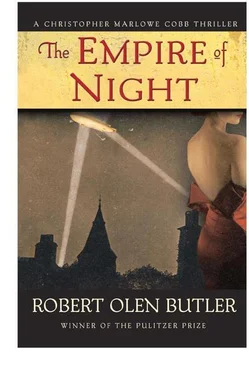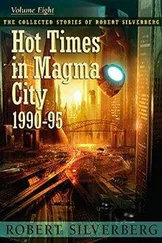I returned to Jeremy, who had the unconscious guard on his face and was binding his ankles and wrists behind him. “Not much of a bout,” I said.
“He was fighting out of his weight class,” Jeremy said.
He said it dry, so I kept my laugh and even my smile to myself. The guard was out of Jeremy’s class all right; he was a good twenty-five pounds bigger, all of it apparent muscle.
“Did you look in the shipping office?” I said.
“Just the packing tables.” He cinched the hog-tie tight.
“The office is the most secure spot on this floor.”
He nodded and finished with a gag job using a couple of oil rags, and we strode across the warehouse floor to the office.
Not only were the lights on, the guard had left the door standing open. He had easy access to the office. It wasn’t promising as a place to stash Stockman’s precious boxes.
I stepped in first. Jeremy lingered just outside.
A desk.
File drawers.
A safe. But it was half the size of even one of the boxes we were interested in.
A work table with ledger books. A small bookcase.
Nothing.
I wasn’t surprised.
I stepped out. “Not secure at all, really,” I said.
We both thought for a moment in silence.
“The boxes aren’t that big, really,” Jeremy said. “They could be anywhere in the building.
“How special are they?” I said.
A rhetorical question.
Jeremy nodded and I said the thing we were both thinking. “We should find this man Reinauer’s office.”
At the end of a corridor on the third floor was a mahogany door and a brass plate: Heinrich Reinauer, Geschäftsführer.
Our man, the managing director.
“Shall I assume you can deal with this?” Jeremy said, in that cultured British tone he sometimes put on.
“You shall,” I said. I handed him the flashlight.
He illuminated a friend of mine from the Great Fraternal Order of Tumbler Locks, of which I was an honorary member. I took out my tools and raked this one quickly and I opened the door for Jeremy as if I were his butler, finding myself very pleased to have shown him my own good right hand.
He grunted admiringly.
We went in and closed the door behind us.
Jeremy immediately switched off the flashlight.
Pitch black.
“Good drapes,” I said.
He lit the flashlight and found the electric light key next to the door.
Reinauer’s corner office, secreted away in a bland brick warehouse building at a come-lately urban river dock, was paneled in oak with glass-doored bookshelves and an oil portrait of himself hung behind a West Wing — size desk. Each of its four windows was draped in a black single panel with a massive gold Imperial Eagle in the center sinking its claws into the planet earth. All befitting a Geschäftsführer .
But the most striking feature of Heinrich Reinauer’s office was the pair of steel-band-strapped wooden boxes sitting in the middle of the floor. Once again I was struck by their size and shape. They were standing with their long side upright. I half expected each of them to contain a three-drawer filing cabinet, the drawers filled with every German secret known to Albert Stockman.
Jeremy and I approached them, however, as gingerly as if we expected them to contain ticking time bombs. We stood side by side before them, silently, without moving, for one beat and then another.
In the center of each of the facing panels was a shipping label. The two labels were set at slightly different angles and showed fragments of previous labels beneath.
Jeremy and I each moved to a box and knelt before it.
The label was an Umladungsformular. A transshipment form. The new address was written by hand.
Jeremy read his aloud. “FVFB. Kalk. MDH.”
I read mine. “Krupp. Essen.”
We looked at each other.
We didn’t need to speak.
Krupp, of course, meant steel. The House of Krupp was what Lord Kitchener and the Brits desperately needed, a homegrown industrialist producing more artillery shells than the rest of the world combined.
Jeremy squared himself to the box, crouched, put his arms around it, and lifted.
Only six or eight inches.
He put the box down again.
He nodded at me to do the same.
I did.
The box went up very heavy, but it didn’t feel like a three-drawer cabinet full of files. Not nearly heavy enough. And the distribution of the weight didn’t feel right. And, of course, there was the matter of its destination.
I put the box down.
I said, “So either Sir Albert is getting Krupp into the milk can business or Krupp is getting Sir Al into the artillery business.”
We took a step back.
Then Jeremy had a thought. He crossed to the box before me, crouched, and lifted that one as well.
He put it down, nodding, and stepped back. “The same weight.”
“A couple of shells,” I said.
“Likely,” Jeremy said. “Empty ones.”
“Then they’re a special design. Stockman, the idea man.”
Jeremy nodded.
We both turned our eyes to the box going to FVFB. Or to MDH.
“Where’s Kalk?” I said.
“Near Cologne.”
The question now hung in the air between us: what was our next move? Which pushed a question on stage that had been lurking in the wings. I said, “My man said the Brits were sending me some help. What did your people say?”
“I was the help.”
For a moment I wondered how Trask had negotiated his way into our running this British show.
Then Jeremy said, “I’m to help the two of you.”
Mother was how. Her crucial access to Stockman was what Trask brought to the table.
But I said, “As far as I’m concerned, you and I are simply in this together.”
Jeremy gave me a single, sharp nod.
I said, “For the record then. We want to figure out the full extent of what Stockman is up to and stop him. Agreed?”
“Agreed.”
We both looked at the boxes.
“They’re nailed and steel-banded,” I said. “Can we look inside and then restore them so Reinauer won’t notice?”
It was a rhetorical question.
We stared at them some more.
“We open them, that’s all we’re going to get,” I said.
“I think we have a good notion what’s in there,” he said.
I was glad to have Jeremy along for this. I kept thinking aloud with him. “How clever can that design be? Is looking at it worth putting these guys drastically on their guard?”
The silence of Reinauer’s office hissed softly around us.
And then I finally put two and two together. I said, “Not an artillery shell at all.”
I’d forgotten it until this moment, but I’d dreamed last night, in my mahogany bed at the Adlon, about the great whirring beasts passing over me in the night, as if I were sleeping on the ocean floor and these were vast creatures of the deep.
“The Zepps,” I said. “He’s about the Zepps and he’s dealing with Krupp. Those are aerial bomb designs.”
Jeremy looked at the boxes as if to confirm this and then back at me.
“No doubt improved,” he said.
I asked the big question. “How badly do we need the design?”
We quietly consulted the boxes again.
They weren’t talking.
“Essen is Krupp’s main foundry, isn’t it?” I said.
“Yes.”
“This is where they’d turn out a million of these.”
“It is.”
“So what’s in Kalk?” I said.
“That’s our more interesting question.”
“I think I was getting pretty close to Stockman last night at the Adlon bar,” I said.
I considered that for a moment. My reporter self had indeed caught a whiff of something. Things were roiling in Albert.
Читать дальше












